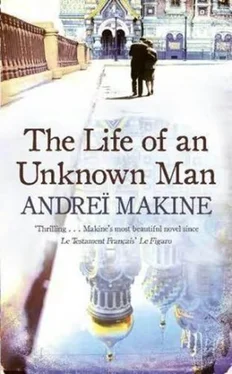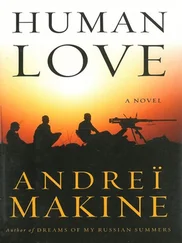Andreï Makine - The Life of an Unknown Man
Здесь есть возможность читать онлайн «Andreï Makine - The Life of an Unknown Man» весь текст электронной книги совершенно бесплатно (целиком полную версию без сокращений). В некоторых случаях можно слушать аудио, скачать через торрент в формате fb2 и присутствует краткое содержание. Жанр: Современная проза, на английском языке. Описание произведения, (предисловие) а так же отзывы посетителей доступны на портале библиотеки ЛибКат.
- Название:The Life of an Unknown Man
- Автор:
- Жанр:
- Год:неизвестен
- ISBN:нет данных
- Рейтинг книги:3 / 5. Голосов: 1
-
Избранное:Добавить в избранное
- Отзывы:
-
Ваша оценка:
- 60
- 1
- 2
- 3
- 4
- 5
The Life of an Unknown Man: краткое содержание, описание и аннотация
Предлагаем к чтению аннотацию, описание, краткое содержание или предисловие (зависит от того, что написал сам автор книги «The Life of an Unknown Man»). Если вы не нашли необходимую информацию о книге — напишите в комментариях, мы постараемся отыскать её.
The Life of an Unknown Man — читать онлайн бесплатно полную книгу (весь текст) целиком
Ниже представлен текст книги, разбитый по страницам. Система сохранения места последней прочитанной страницы, позволяет с удобством читать онлайн бесплатно книгу «The Life of an Unknown Man», без необходимости каждый раз заново искать на чём Вы остановились. Поставьте закладку, и сможете в любой момент перейти на страницу, на которой закончили чтение.
Интервал:
Закладка:
“I’ll pay what it costs. Tell me your price. We can agree on a figure.”
“But I’m telling you there’s no fixed fare. And we’ve got to lug the… grandpa downstairs into the bargain!”
“A hundred dollars, would that do?”
“You’re joking. For a trip like that…”
“Five hundred?”
“Listen, pal, you have a think about it and call me next week. OK?”
He turns away, opens the door. Shutov catches him on the landing, negotiates, ends up giving him three hundred-dollar notes. He glimpses a rather childish delight on the man’s face: pleasure at having ripped off a simpleton, surprise, pride in having come out on top. Money does not yet have an established value in this new country; there’s an element of roulette about it and he has won.
He drives quite slowly at first, doubtless for fear of running into a police patrol. But once outside the city, he speeds along, straight over every crossroads. It feels as if he is beginning to relish this escapade. Shutov winds down the window: monotonous suburban streets hurtle past, a city asleep, and from time to time, within the endless slabs of building fronts, a window lit up, very yellow, a life keeping watch.
At last, like the lash of a branch, the scent of grass, the bitter night smell of foliage. The car leaves the main road, begins jolting along badly paved lanes. Two or three times the old man tries to point the way but the driver rejoins, “No, man. That village doesn’t exist anymore… They’ve got a shopping center there now…” His tone of voice has changed, he responds to Volsky in somewhat contrite tones…
And suddenly he brakes, surprised himself by a barrier across the road.
Beyond it arises a veritable wall, at least twelve feet high. A bronze plaque set into a stone pillar gleams in the headlights. Richly ornamental letters imitating Gothic script: “Palatine Residential Estate: Private Road. Residents only.” The driver gets out, with Shutov close behind him. Beyond a monumental wrought iron gate can be seen the outlines of the “palaces,” illuminated by the floodlights of a building site. A crane throws the shadow of its hook across a wall. A bulldozer sleeps beneath a tree. Site offices stationed at each corner of the enclosure are reminiscent of watchtowers…
The resemblance is not lost on Volsky. “It looks like a prison,” he murmurs, when the two men get back into the car.
“What do you want me to do?” asks the driver. “Try to work around it?” And without waiting for a word from Shutov and Volsky he drives off. Rising to this challenge becomes a point of honor for him. The car gets stuck in the mud almost at once and Shutov has the door half open, ready to get out and push. “It’s OK!” snorts the driver, twisting the wheel and looking as if he were wrestling a bull with his bare hands. A long hysterical scream from the engine, a painful slithering, and finally they shoot away, like a bat out of hell.
Their progress becomes steadier now, lulled as they sway broadly along a dirt road, the rustling of tall plants can be heard against the sides of the car. The air smells more and more of the coolness of a river. The beam from the headlights comes up against a plantation of willows. They follow a slope. They stop. The headlights are switched off, their eyes quickly grow accustomed to the pale northern night. Silence settles and the ear begins to identify the tiniest rustlings. The music of the long willow leaves, the soporific purling of the current, from time to time a quick, frail call emitted by a bird in flight…
The driver helps Shutov to settle Volsky down at the shore’s edge on the broad trunk of a felled tree whose timber, stripped of its bark, traces a white line in the darkness. Without needing to confer, the two men move away.
They inhale deeply, amazed by the lively sharpness of the air, by this calm found very close, after all, to the bustle of the festive city. To their right, against the background of the sky’s ashen pallor, can be seen the line of the Palatine Residential Estate’s enclosure (“Excelsior,” “Trianon”… Shutov remembers). On the far bank coppices separated by long pathways can be divined. “The trees Volsky and Mila planted,” he thinks, “the graveyard…” In the sky a mass of transparent clouds; from time to time a star shivers, very close, alive.
The driver, sitting on a tree stump, mutters something. He turns his wrist to make out the illuminated dial of his watch in the darkness. Shutov reassures him: “We’ll be on our way soon…” “No, let the old man take his time! I don’t get much work at night…” His tone is still marked by a trace of guilt. “He was really in the war here?” he asks. Shutov whispers, as if someone could hear them. Yes, it was here. The blockade of Leningrad; the last concert given by a theater troupe; and then this old man, a young soldier at that time, pushing a gun along a frozen shore; Berlin. He becomes aware that he is now the only person in the world who knows Volsky’s story so well…
He breaks off as he hears a voice rising up from the stream. The singing must have begun to ring out a moment ago but was mingled with the rustle of the willows, the murmur of the grasses. Now its melody dominates the silence, ripples effortlessly, like a very long, deep sigh. The driver is the first to get up, his face turned toward the source of the sound. Shutov stands as well, takes several steps toward the bank, stops. It is a song that gives back a forgotten, primal meaning to all that he can see: the earth, laden with dead, and yet so light, so full of springtime life, the ruins of an old izba, the imagined radiance of those who lived there and loved one another beneath its roof… And this sky, beginning to turn pale, which Shutov will never look at again the way he did before.
The return journey seems like lightning, almost instantaneous. As if these early-morning streets, totally empty, are vanishing as they pass through them.
And in the apartment this speeding up is even more feverish. The old man is hardly settled in his bed when Vlad arrives, passing the taxi driver in the hall. The door slams behind the latter, Shutov turns and sees placed there within the marble hand, “Slava’s hand,” which lies on the occasional table, three hundred-dollar notes…
And already the paramedics are ringing the bell and cluttering up the corridor with their wheelchair. Shutov slips into Volsky’s room hoping to be able to speak to him again, to tell him that his story… They shake hands. The paramedics are there, Vlad as well, they are busy packing the old man’s books into a bag… Volsky’s eyes smile at Shutov for the last time, then his face freezes into a final, indifferent mask.
The entrance hall teems with Vlad’s friends, who are coming to the party at Yana’s country house. The workmen make way for the two paramedics taking the old man away and start bringing in pipes for the plumbing. A housekeeper drags in a vacuum cleaner, dives into the little bedroom, now finally vacated. Various cell phones ring, conversations overlap, become mixed up…
Shutov drinks a cup of tea in the kitchen and tries to picture himself as still involved in the whirlwind occurring all around him. “Ma has just called,” shouts Vlad. “She’ll be here in ten minutes. She says hello…” Someone has switched on the television. “To be on time, when every second counts…” “You wouldn’t have a cigarette?” a very young woman asks him, and he suddenly feels struck dumb, stammers, gesticulates. She laughs, goes away.
It comes to him at last, with blinding clarity: he would never be able to exist in this new life.
Five minutes suffice to gather up his belongings, to slip toward the door without being intercepted by Vlad, to leave…
Читать дальшеИнтервал:
Закладка:
Похожие книги на «The Life of an Unknown Man»
Представляем Вашему вниманию похожие книги на «The Life of an Unknown Man» списком для выбора. Мы отобрали схожую по названию и смыслу литературу в надежде предоставить читателям больше вариантов отыскать новые, интересные, ещё непрочитанные произведения.
Обсуждение, отзывы о книге «The Life of an Unknown Man» и просто собственные мнения читателей. Оставьте ваши комментарии, напишите, что Вы думаете о произведении, его смысле или главных героях. Укажите что конкретно понравилось, а что нет, и почему Вы так считаете.









